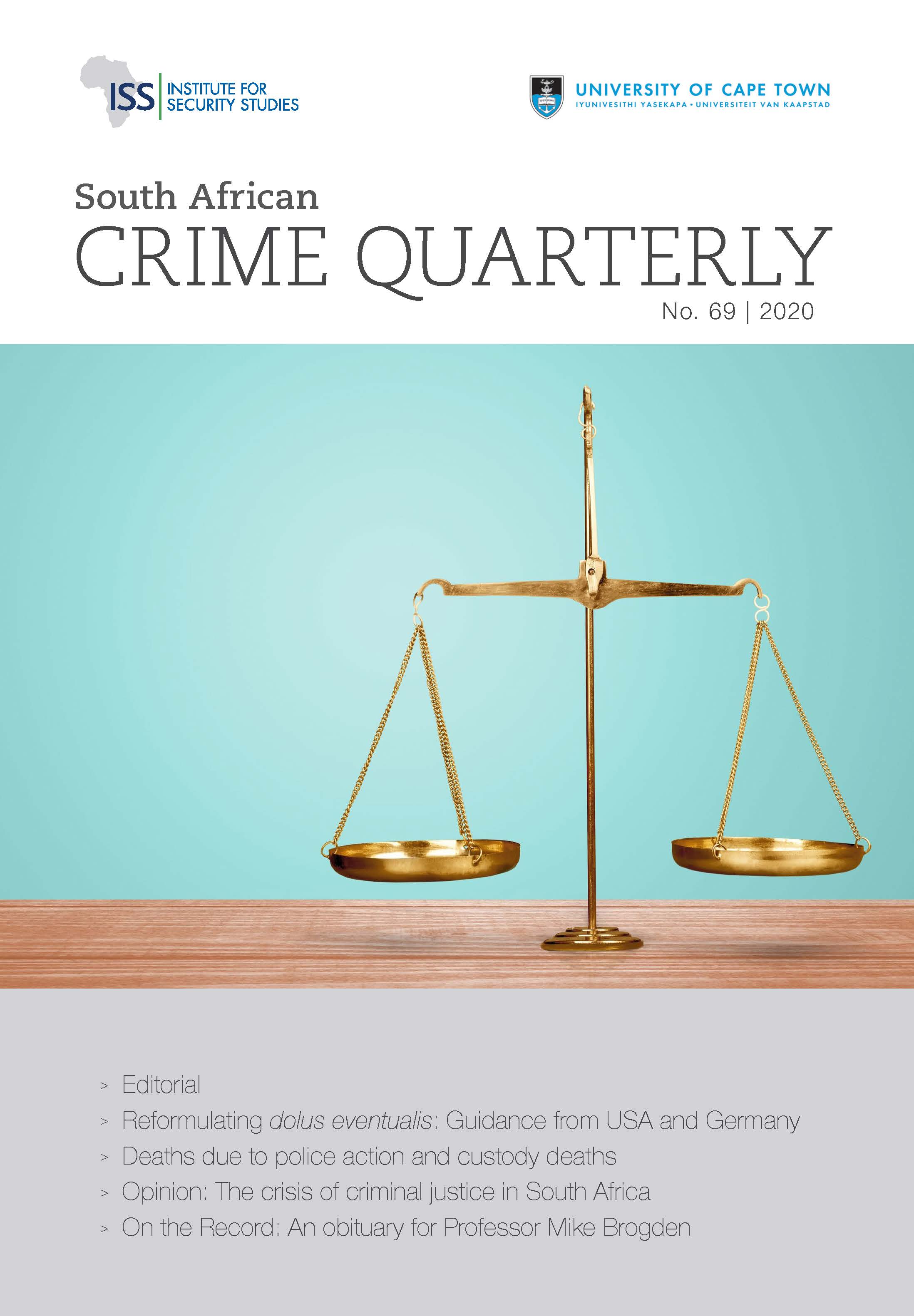No. 69 (2020): SACQ 2020

From 2020 onwards, articles in South African Crime Quarterly appear in a single edition per year, published on a continuous publication model.
The collection includes an article by Kirstin Hagglund and Franaaz Khan on the so-called legal 'enigma' of dolus eventialis. Using German and American law for guidance, the authors examine the test for dolus eventualis in the case of murder and determines whether it can be more clearly distinguished from culpa, in the case of culpable homicide.
Shimon Barit, Lorraine du Toit-Prinlsoo and Gert Saayman examine deaths due to police action and deaths in custody through a retrospective descriptive audit of cases admitted at the Pretoria Medico-Legal Laboratory. Compared with other countries, the authors find a high number of firearms-related fatalities in the deaths resulting from police action, and an absence of deaths due to conditions like excited delirium or deaths associated with illicit drug intoxication. They argue that there is a need for for objective, impartial and competent medico-legal investigation into deaths of this nature.
Hennie van As highlights the threat that South Africa's marine living resources face from international organised crime syndicates in conjunction with local fishers, eroding the rule of law and contributing to the proliferation of gangsterism. He argues that SAPS are not using the full power of the law to address poaching of marine resources and concludes that an appropriate response requires the full might of the law and the improvement of national fisheries resource management to ensure that local communities benefit.
Delano van der Linde discusses the criminalisation of gang activity under the Prevention of Organised Crime Act 121 of 1998. He argues that the Act creates the ‘super-criminalisation’ of gang activity given the preexistance of similar common law and statutory measures to deal with these crimes and discusses whether there is sufficient basis to argue for the additional responsibility of gang leaders, which is currently left uncovered by the Act.
Sheena Swemmer presents evidence from a set of 102 rape cases in South Africa, showing how prosecutors and presiding officers problematically use evidence of previous sexual history during rape trials, despite the protections to the contrary. Providing examples from cases, the author argues that comprehensive training for prosecutors and presiding officers to address the social context of rape, gender stereotyping and rape myths, as well as on the questioning of witnesses can help to remedy the problem. She argues that the prejudiced and biased practices in the courts continue to undermine the credibility of the complainant.
Hennie van As and Deon Erasmus write that people who pay admission of guilt fines often think that the fine finalises the judicial process with no criminal record, but later discover with shock that they in fact have a criminal record, with severe consequences. Their article examines the consequences for a person who pays an admission of guilt fine, investigates whether there is a duty on Legal Aid South Africa to provide legal assistance in these matters and whether an administrative infringement process should be investigated.
Fatima Osman examines the Traditional Courts Bill (B1B-2017), which omits the so called 'opt-out clause' and provides that individuals are bound to attend a traditional court when summoned. This conflicts starkly with the notion of customary law as a voluntary and consensual system of law. This article argues that compelling individuals to attend a traditional court may be unconstitutional for unjustifiably infringing the rights to culture, a fair trial and equality.
Edwin Cameron discusses what he terms a controversial and often overlooked crisis in the criminal justice system – the minimum sentencing regime. He argues that the minimum sentencing regime is not well-suited to curbing crime and making South Africans safe, but instead is a misdirected, hugely costly and ineffective way of punishing criminals and dealing with crime.
Elrena van der Spuy pays tribute to Mike Brogden, who passed away in 2019. Brogden's work on crime, criminal justice and policing in the context of social history shaped converstations on police reform and the field of criminology in South Africa.
Anine Kriegler interviews Shaun Shelly about recent developments in South African Drug Policy in the wake of the 2018 Constitutional Court judgment decriminalising personal possession of cannabis, and the subsequent Cannabis for Private Purposes Bill. Shaun is the founder of the South African Drug Policy Week and is the drug policy lead at TB HIV Care.
Sipho Mzakwe analyses the case of Social Justice Coalition and Others v Minister of Police and Others, which found that that the distribution of police personnel in the Western Cape unfairly discriminated against black and poor people on the basis of race and poverty. As the first case in South Africa recognising poverty as a discrete ground of discrimination, the judgment marks a significant development in the country’s equality rights jurisprudence. The case also has profound implications for the system of allocating police resources in that province, and potentially across the country.


.png)